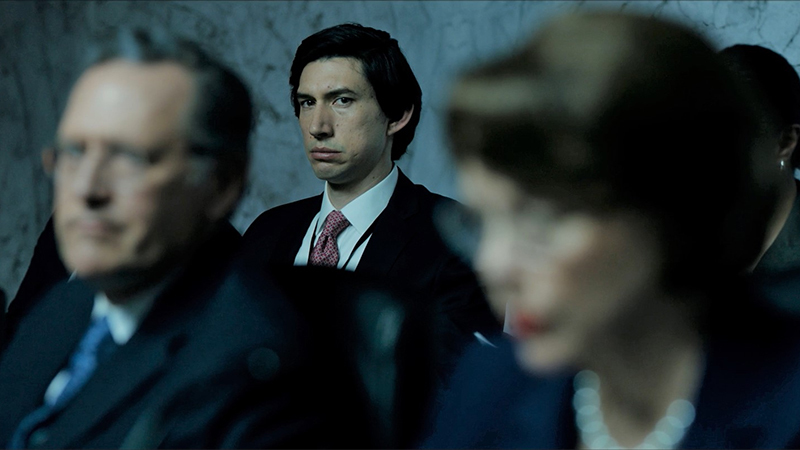The Report
Dec 10, 2019
Just as Steven Spielberg’s The Post (2017) was a particularly timely reminder two years ago about the importance of the news media in fact-checking and holding the government accountable during a time when screeches of ‘œFake news!’ had become a myopic (and dangerous) defense against news reporting, Scott Z. Burns’s The Report is a particularly timely reminder about the importance of the system of inter-governmental checks and balances within a constitutional democracy during a time when that system seems more endangered than ever. The news right now is dominated by the unfolding narrative of Donald Trump’s ongoing impeachment’”which is either a necessary remedy to remove a lawless President who has been abusing his office for political advantage or a baseless revenge tactic by the party to whom he lost in 2016, depending on your political perspective’”so what better time to revisit another contentious inter-governmental investigation, in this case the multi-year Senate inquiry into the CIA’s use of torture’”excuse me, ‘œenhanced interrogation””against terrorist suspects following 9/11.
The titular document in The Report is the 6,700-page ‘œCommittee Study of the Central Intelligence Agency’s Detention and Interrogation Program,’ also known as ‘œThe Torture Report,’ which began after a two-year investigation of the CIA’s destruction of more than 100 videotapes of interrogation sessions in 2005. The investigation is spearheaded by Senator Dianne Feinstein (Annette Bening), the head of the Senate Select Committee on Intelligence (SSCI), and she taps Senate staffer Daniel Jones (Adam Driver) to run it. Jones is young and determined, and in virtually every way he is presented as a model of decency, honesty, and tenacity’”a kind of nonpartisan government warrior who wages battle in a windowless room in a government office basement surrounded by stacks of papers and walls covered with charts and sticky notes. If the film has a weakness, it is that it presents Jones as perhaps too noble and incorruptible’”a modern-day Elliott Ness plowing through millions of documents, emails, cables, and memos to piece together an elaborate narrative about how the CIA betrayed the country’s highest ideals in torturing detainees.
Writer/director Scott Z. Burns, who is probably best known for his writing collaborations with director Steven Soderbergh (who executive produced The Report) like The Informant! (2009), Contagion (2013), and Side Effects (2014), orchestrates a great deal of narrative information and a major cast of more than two-dozen characters in a way that is both compelling and easy to follow by those who may have heard of ‘œwaterboarding,’ but still aren’t sure exactly what it is (other than bad). He shows us not just Jones’s investigation, which proceeds as an increasingly absording, slow-burn mystery, but also what was happening inside the CIA and how they shift to and then justify torture techniques in order to get vital information out of detainees. Burns depicts a number of these characters with various levels of empathy, even those like Maura Tierney’s Bernadette, who support, enable, and defend the use of torture, by showing how they genuinely think their actions will help protect the U.S. from future terrorist attacks. Even though virtually all evidence suggests that torture is not a useful tactic in extracting useful information, they follow their guts and their fears, which leads them (and, by proxy, us) into a dark place of physical torment and dehumanization.
If the film has a true villain, it is the architects of the program, two former Navy psychologists who essentially reverse engineer Navy SEAL training techniques into ‘œenhanced interrogation.’ They, in effect, weaponize psychology, and then set about offering excuse after excuse about why it isn’t working like they said it would while profiting mightily. Even politicians like CIA head John Brennan (Ted Levine) are given some degree of latitude in showing why they act like they do, which keeps the film from sliding into easy finger-pointing (it does make the point repeatedly, though, that it was Republicans who were constantly in favor of burying the reports or stonewalling the investigation, all of which is factually true and aligns quite neatly with what is happening in the news today).
Still, the film belongs primarily to Adam Driver, who creates a compelling character out of Daniel Jones despite the fact that we know little about him outside of his willingness to sacrifice virtually everything else in his life’”namely relationships and sleep’”in pursuit of a truth that could very well be buried by the very bureaucracy for which he works (at one point, he becomes a target for the CIA and is very nearly ruined in a trumped-up criminal investigation). Annette Bening also deserves note for her portrayal of Feinstein, who here is shown to be a dogged fighter who has moments of reluctance, when it seems that political expediency is a better route than getting the full truth on the table, but ultimately comes through and makes it possible for Jones’s years of work to see the light of day. Putting the worst sins of our government on the table for all to see is one of the things that ostensibly separates the U.S. from so many other countries, which is why there is some sense of optimism in The Report. The process of maintaining accountability may be messy and difficult and riddled with tensions and conflicts and points of obstruction, but as the film shows, it can work.
Copyright © 2019 James Kendrick
Thoughts? E-mail James Kendrick
All images copyright © Amazon Studios



